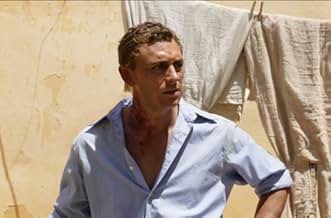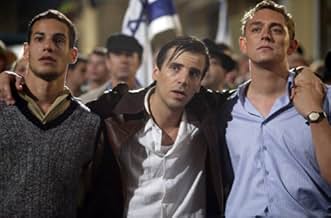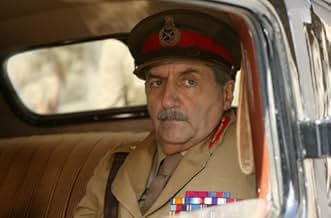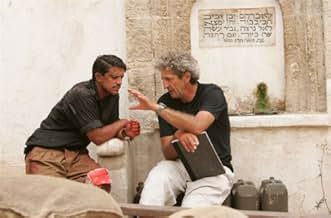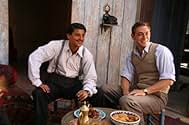IMDb RATING
6.0/10
1K
YOUR RATING
A tale of friendship between two men, one Jewish and the other Arab, as the country of Israel is being created.A tale of friendship between two men, one Jewish and the other Arab, as the country of Israel is being created.A tale of friendship between two men, one Jewish and the other Arab, as the country of Israel is being created.
Mhairi Morrison
- Cathy
- (as Mhairi Steenbock)
- Director
- Writers
- All cast & crew
- Production, box office & more at IMDbPro
Featured reviews
That, oh so poignant verse from Psalm 137 altogether sums my impressions of the film. By all means, I am kind with my assessment. This should have been a great film, provided, the Hollywood script writers followed the book's theme. Alas, they did not; what else is new under the sun!
Despite its potential, the film did not explore or enunciate enough two of its main themes: the futility of war and more important, man's continued penchant to inflict inhumanity on fellow man. Oh yes, Bobby Golden Boy Goldman, one of the film's major players does indeed state either or both of those strong tenets even boldly. However, he does so en passant. Moreover, his excellent points are nonetheless made moot as the director cuts to the chase and the next bloodied then quickly sanitized atrocious conflict scene time and again. And there were so many of these telegraphed, goofy scenes. So many in fact,that soon I lost count.
Not long after, quite frankly I lost any or all lingering interest to stick it out until the curtain fell. Thank God for that tender mercy. This low budget, grade 'B' production could not end soon enough.
Before I exit, I must say that the film's depiction of the British protector-ship of the former Palestine was well, pathetic. Yes, we got it; the Thin Red Line had already gone bald and lost all of its former glory by that point. However, to paint them redder, er, yellow and to make them appear more inept even treacherous to the Hebrew cause, is well taking many creative, film making liberties.
Sure, the Brits neglected their peace keeping role while there. Even General Barker voiced his 'haaarrumph' stilted opinion and attested to that very fact while protesting to the then backpedaling, fleeing British High Commissioner. Still, he did so in a not so poignant manner nor propitious moment. No matter. The film had already gone so far south that it was difficult for me to discern which way lay O Jerusalem let alone the true path to peace.
I believe, the director and producer, though in an odd way tried to make their best case (whatever that was, we will never know). To wit, they could have done better with the film's plot if they had invested more time in exploring that noble road map to peace theme. No doubt, that lofty goal was well within their grasp and cinematic scope. However, all too predictably they instead chose to either neglect it, cut it first pass, or simply cast it aside altogether, just the same.
Like the British, Hollywood just could not help themselves nor the script. At every turn the actors fumbled the football, or bungled the entire dialog until finally, together, the flimsy cast and entire film crew botched what should have been an otherwise beautiful, possibly even most edifying film.
Forget about it!
Sigh...
Despite its potential, the film did not explore or enunciate enough two of its main themes: the futility of war and more important, man's continued penchant to inflict inhumanity on fellow man. Oh yes, Bobby Golden Boy Goldman, one of the film's major players does indeed state either or both of those strong tenets even boldly. However, he does so en passant. Moreover, his excellent points are nonetheless made moot as the director cuts to the chase and the next bloodied then quickly sanitized atrocious conflict scene time and again. And there were so many of these telegraphed, goofy scenes. So many in fact,that soon I lost count.
Not long after, quite frankly I lost any or all lingering interest to stick it out until the curtain fell. Thank God for that tender mercy. This low budget, grade 'B' production could not end soon enough.
Before I exit, I must say that the film's depiction of the British protector-ship of the former Palestine was well, pathetic. Yes, we got it; the Thin Red Line had already gone bald and lost all of its former glory by that point. However, to paint them redder, er, yellow and to make them appear more inept even treacherous to the Hebrew cause, is well taking many creative, film making liberties.
Sure, the Brits neglected their peace keeping role while there. Even General Barker voiced his 'haaarrumph' stilted opinion and attested to that very fact while protesting to the then backpedaling, fleeing British High Commissioner. Still, he did so in a not so poignant manner nor propitious moment. No matter. The film had already gone so far south that it was difficult for me to discern which way lay O Jerusalem let alone the true path to peace.
I believe, the director and producer, though in an odd way tried to make their best case (whatever that was, we will never know). To wit, they could have done better with the film's plot if they had invested more time in exploring that noble road map to peace theme. No doubt, that lofty goal was well within their grasp and cinematic scope. However, all too predictably they instead chose to either neglect it, cut it first pass, or simply cast it aside altogether, just the same.
Like the British, Hollywood just could not help themselves nor the script. At every turn the actors fumbled the football, or bungled the entire dialog until finally, together, the flimsy cast and entire film crew botched what should have been an otherwise beautiful, possibly even most edifying film.
Forget about it!
Sigh...
I thought I am not a good candidate to write a review about the movie (Being a Jew who was born in Israel) - Until I saw the other review here and I was shocked and sadden.
There are many "views" of what really happened in 1948. Each side holds its own view to events, as Akira Kurosawa's "Rashomon" wisely tells us about the subjectivity of truth and the uncertainty of factual accuracy.
The independence war is part of Israel's collective memory as it is to the Arab side. Of course anything that I will write will be influenced with that filtration - as well as the previous reviewer and possibly the reviewers to follow. We all "own" our subjective truth.
So Instead of replying to the previous reviewer with "my facts" to the events that took place in 1948 in order to contradict his claims, I will halt here and urge you to not to give up upon your believes but to hold them back and see the movie. You will not regret it.
Yes, I know the movie will not be enjoyable to or appreciated by everyone. If you are an Arab or Jew extremist you will probably leave the cinema in the middle of the movie - If you wish to see a one-sided, "the truth is here" movie I suggest you see a Michael Moore movie.
But if you wish to see a movie with a brilliant script that tries to touch the human triumph and tragedies of the 1948 war with a superb cast that will make you shed a tear this movie for you.
There are many "views" of what really happened in 1948. Each side holds its own view to events, as Akira Kurosawa's "Rashomon" wisely tells us about the subjectivity of truth and the uncertainty of factual accuracy.
The independence war is part of Israel's collective memory as it is to the Arab side. Of course anything that I will write will be influenced with that filtration - as well as the previous reviewer and possibly the reviewers to follow. We all "own" our subjective truth.
So Instead of replying to the previous reviewer with "my facts" to the events that took place in 1948 in order to contradict his claims, I will halt here and urge you to not to give up upon your believes but to hold them back and see the movie. You will not regret it.
Yes, I know the movie will not be enjoyable to or appreciated by everyone. If you are an Arab or Jew extremist you will probably leave the cinema in the middle of the movie - If you wish to see a one-sided, "the truth is here" movie I suggest you see a Michael Moore movie.
But if you wish to see a movie with a brilliant script that tries to touch the human triumph and tragedies of the 1948 war with a superb cast that will make you shed a tear this movie for you.
My major gripe is not the slant, the film was not a propaganda screed for either side, but it is so inaccurate as to be nearly worthless. First, any one who spent any time in Israel will note immediately that it was not filmed there, the scenes do not remotely resemble the real sites where the events of 1948 took place. Major facts are fumbled--e.g., the Jewish Quarter of the Old City fell long before the first cease-fire (from the movie, it is hard to tell exactly what happened). In another scene, right before the Partition vote travelers are shown on a modern-style glass bus from Tel Aviv to Jerusalem--going over a non-existent river--with Arabs and Jews on the same bus!
The acting is TV-grade melodrama and the script is trite.
As for the overview-historical content, the movie falls to illuminate the events the lead up to the conflict--and with the single exception of the depiction of Deir Yassin, makes it seem as though the war was fought between a handful of well-meaning nice guys. But the 1948 war was bloody and ugly, with many atrocities committed on both sides, but especially the Arab side that was trying to wipe out the Jewish community of Palestine (later Israel).
Finally, as already pointed out, this movie does horrible violence to LaPierre and Collins' fine book, one of the few truly even-handed non-fiction books written about the Arab-Israel conflict (In the trailer, even this was mangled as the book is called a "novel").
If any one wants to see a much better movie covering almost the exact same topic get "Cast a Giant Shadow."
The acting is TV-grade melodrama and the script is trite.
As for the overview-historical content, the movie falls to illuminate the events the lead up to the conflict--and with the single exception of the depiction of Deir Yassin, makes it seem as though the war was fought between a handful of well-meaning nice guys. But the 1948 war was bloody and ugly, with many atrocities committed on both sides, but especially the Arab side that was trying to wipe out the Jewish community of Palestine (later Israel).
Finally, as already pointed out, this movie does horrible violence to LaPierre and Collins' fine book, one of the few truly even-handed non-fiction books written about the Arab-Israel conflict (In the trailer, even this was mangled as the book is called a "novel").
If any one wants to see a much better movie covering almost the exact same topic get "Cast a Giant Shadow."
Although the film describes historical events in a relatively balanced way, eventually tends to tip the balance on the Israeli side, like most movies that reach the western circuit. I guess that the producers coming from that side or afraid of failing in the US market, highly influenced by the Jewish lobby, is behind that.. Why French actors were involved in this project? At the end a story of friendship in a world in conflict but a more dispassionate and objective look is needed. That a successful best seller was the main source does not ensure that the script will match (this is the case). In light of current events, the somewhat romantic look in other movies (Exodus for example) is given on the emergence of the state of Israel, is at least anomalous. Some of it is on this film.
The subject of this film is difficult, a friendship and a war that comes in between friends. I would have given it a 9 but the propaganda in the film brings it down big time. This is not a historical film but it appears that some key dates have been followed.
Why do I call it a propaganda film? Because, it shows good and bad on both sides but actually it subtly forces the viewer to sympathise with one side. This is the art of propaganda. Also called brainwashing which keeps happening again and again. It feels that we will see many more propaganda films in the future. Also, the Brits got the wrong end of the stick, which is almost funny.
The two main characters, Bobby and Said are very likable as they appear as very genuine blokes. Their friendship is a real pleasure to watch, shame it was used to cover up the real agenda.
Why do I call it a propaganda film? Because, it shows good and bad on both sides but actually it subtly forces the viewer to sympathise with one side. This is the art of propaganda. Also called brainwashing which keeps happening again and again. It feels that we will see many more propaganda films in the future. Also, the Brits got the wrong end of the stick, which is almost funny.
The two main characters, Bobby and Said are very likable as they appear as very genuine blokes. Their friendship is a real pleasure to watch, shame it was used to cover up the real agenda.
Did you know
- GoofsIn the United Nations General Assembly vote on partition, a vote is heard from Myanmar. This name was used only since 1989 by the military government; Burma is still the name recognized by the U.S. and most of the world.
- Quotes
Golda Meir: Your Majesty, we could never accept it. You know this. Of course we want peace, But we also want a land of our own.
- ConnectionsReferenced in Le voyage du ballon rouge (2007)
- How long is O Jerusalem?Powered by Alexa
Details
- Release date
- Countries of origin
- Official site
- Languages
- Also known as
- Beyond Friendship
- Filming locations
- Production companies
- See more company credits at IMDbPro
Box office
- Budget
- $24,000,000 (estimated)
- Gross US & Canada
- $234,480
- Opening weekend US & Canada
- $31,165
- Oct 21, 2007
- Gross worldwide
- $2,724,303
- Runtime
- 1h 40m(100 min)
- Color
- Sound mix
- Aspect ratio
- 2.35 : 1
Contribute to this page
Suggest an edit or add missing content


